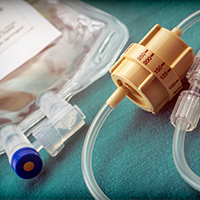Morphine is addictive and has a high potential for abuse. If you’re concerned you or a loved one is struggling with morphine contact us for help today.
 Morphine was one of the original opioids. Used since the 1800s in the United States as a medicinal drug for pain and other ailments. It was isolated from opium as the active narcotic ingredient that was providing the painkilling properties. When pure, this form has greater strength than opium. It became popular for managing pain during the Civil War and beyond. Leading to an addiction epidemic in the late 19th century.
Morphine was one of the original opioids. Used since the 1800s in the United States as a medicinal drug for pain and other ailments. It was isolated from opium as the active narcotic ingredient that was providing the painkilling properties. When pure, this form has greater strength than opium. It became popular for managing pain during the Civil War and beyond. Leading to an addiction epidemic in the late 19th century.
Over time, people tried to create different forms of morphine that would provide the same benefits without the addictive potential. The results were heroin and prescription painkillers such as oxycodone and codeine, which we now know are also highly addictive. These opioids follow in the footsteps of morphine. Regardless if they are natural opiates derived from the same opium poppy plant or are manmade in semi-synthetic or synthetic forms.
Morphine is still used today as a narcotic analgesic for fighting pain. Nonetheless, it hasn’t lost its associated risk, and its use can lead to dependency and addiction. Perhaps morphine dependency has impacted your own life. Did you begin taking morphine through your doctor and are now addicted? Whether or not this is your situation, addiction can take over your life and lead you on a downhill path. But treatment can help you go in a different direction to overcome an addiction to morphine.
In the past, people found out the hard way that morphine can lead to dependence. Now we know more about how it affects the brain and body. Which tends to limit its use in the medical field in favor of other drugs.
Like other opioids, morphine use changes the way the brain functions, leading to tolerance and withdrawal. When you take morphine, it attaches to receptors in the brain, stimulating the release of the brain chemical dopamine. This chemical is connected to motivation, reward, memory and movements of your body. Your brain can learn that it needs morphine to release dopamine, thus failing to release it or release enough of it on its own. This process leads to dependency on morphine. Therefore you’ll need to keep feeding your brain more of the drug to keep the cycle going. If you stop using it, you can face difficult withdrawal symptoms. Such as headaches, muscle aches and chills. This will continue until your brain readjusts to its normal functioning.
This and other effects of morphine in the brain can lead you to dependency and addiction. Even when you follow your prescription, morphine can be habit-forming. Nonetheless, straying from your prescription in any way, such as using more than prescribed or continuing to take it after you should have stopped, can increase your chances of developing addiction. Also, relapse is likely with morphine. Hence even if you are able to stop using you may go back to it.
Morphine is meant for higher levels of pain, from the moderate to severe range. Likewise, the extended-release forms are meant only for severe and continuous pain that is not successfully managed by anything else. When you have mild pain, require an as-needed option or non-narcotic pain relievers do the trick. Best practice is that doctors will choose other medications before turning to morphine.
A professional treatment program can help you overcome dependency to morphine and the changes in your behaviors caused by addiction. A detox program provides medical monitoring to ensure you go through withdrawal in a safe and effective way. This first stage of treatment can help you taper off morphine to reduce and/or manage withdrawal symptoms with the help of medications. By relying on professional assistance, the withdrawal process can be easier for you, and you will therefore be less likely to turn to morphine or other drugs to make the withdrawal symptoms stop.
If you have morphine addiction, you could have developed behaviors that changed your life because of the drug. Your life could be focused on the drug use, which could negatively affect your work life and family life. It can harm your finances, your health and your relationships. These are just some of the problems addiction can create. Even if the substance use feels like an escape or a way of coping with life’s difficulties, it tends to increase the likelihood of problems over time.
Rehab treatment can help you change this direction of your life. Rehab takes place after you have gone through the withdrawal phase, so you are no longer dependent on the drug. During rehab treatment, you work with addiction professionals on what led you to addiction, how it has affected your life and how you can move forward without relying on a substance. Rehab can also help if you have a co-occurring disorder with another substance or a mental health disorder.
At Transformations Treatment Center, we provide individualized treatment for morphine addiction. Through our Summit Detox facility, we can help you get through the difficult symptoms of the withdrawal period. Then, we’ll create a custom rehab treatment plan that will help you change your thoughts and behaviors in a healthier direction. Our aftercare program encourages you to stay on track with recovery to counteract the risk of relapse associated with morphine.
If you or a loved one need morphine rehab in Delray Beach, FL please contact us today at 800-270-4315.